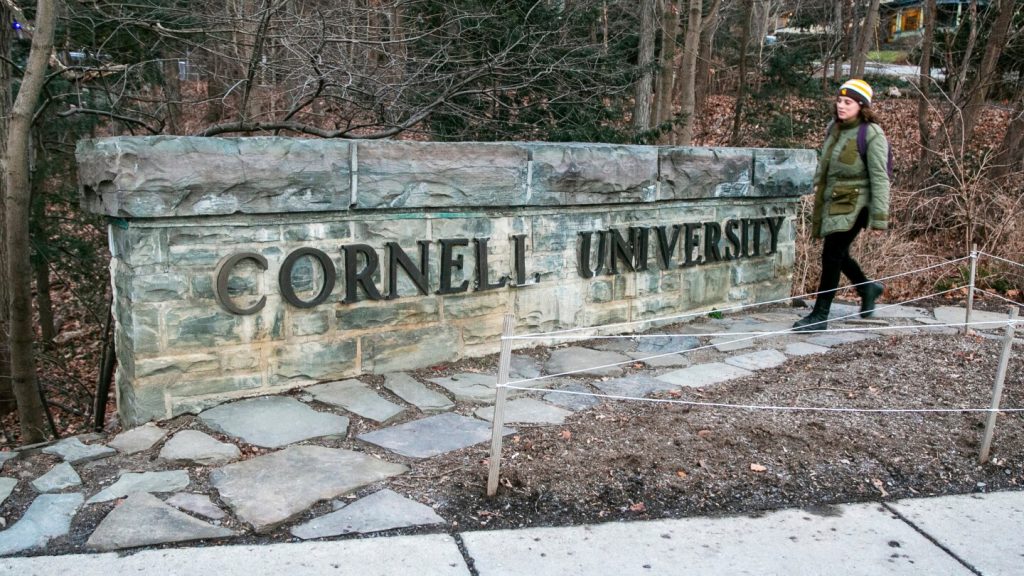Listen to the article
Cornell University has agreed to pay $60 million and accept the Trump administration’s interpretation of civil rights laws to restore federal funding and end government investigations, university President Michael Kotlikoff announced Friday.
The agreement will unlock more than $250 million in federal research funding that had been withheld amid allegations of civil rights violations at the Ivy League institution. Cornell will pay $30 million directly to the U.S. government and invest another $30 million in agricultural research that supports American farmers.
“The funding freeze had stalled research, upended careers and threatened the future of academic programs,” Kotlikoff said in his announcement, emphasizing that the agreement upholds the university’s academic freedom while restoring its partnership with the federal government.
This settlement marks the latest development in President Donald Trump’s ongoing confrontation with elite higher education institutions, which he has accused of tolerating antisemitism and promoting progressive ideologies. The administration remains in a standoff with Harvard University while taking an incentive-based approach with other institutions by offering preferential access to federal funding for schools that align with its agenda.
The six-page agreement between Cornell and the federal government is similar to one signed by the University of Virginia last month, though shorter and less restrictive than agreements reached with Columbia University and Brown University. Under the terms, Cornell must comply with the government’s interpretation of civil rights laws regarding antisemitism, racial discrimination, and transgender issues.
Faculty and staff will be required to use a Justice Department memo as a training resource—a document that instructs colleges to abandon diversity, equity, and inclusion programs and certain transgender-friendly policies. Cornell must also provide extensive admissions data to ensure compliance with the 2023 Supreme Court decision ending affirmative action in college admissions.
Education Secretary Linda McMahon characterized the agreement as “transformative,” saying it prioritizes “merit, rigor, and truth-seeking” and represents “a huge win in the fight to restore excellence to American higher education.”
Attorney General Pam Bondi added that the agreement demonstrates the benefits for colleges that cooperate with the administration, stating that institutions receiving federal funds “must fully adhere to federal civil rights laws and ensure that harmful DEI policies do not discriminate against students.”
Cornell’s president will be required to personally certify compliance with the agreement each quarter through the end of 2028. The deal appears to strike a middle ground on direct payments to the government compared to other institutions—Columbia agreed to pay $200 million directly to the government, while Brown University committed $50 million to state workforce organizations, and Virginia’s agreement included no payment.
Cornell’s $30 million agricultural investment, to be distributed over three years, will support programs incorporating artificial intelligence and robotics with the goal of reducing costs for U.S. farmers—a nod to the university’s roots as a land-grant institution with longstanding ties to American agriculture.
Cornell’s chapter of the American Association of University Professors acknowledged that the agreement “omits many of the worst provisions” seen in other college settlements but expressed concern that it still threatens academic freedom and exceeds legal requirements.
“One of the major concerns with these agreements generally has been, if you make a deal with somebody when they’re just extorting you, well, that only encourages future extortion,” said chapter president David Bateman.
The campus AAUP specifically objected to requirements for sharing enrollment data and conducting campus surveys on antisemitism, as well as the $30 million payment to the government, which they characterized as “extortion plain and simple.”
Kotlikoff, who was among hundreds of university presidents who signed an April letter opposing “unprecedented government overreach and political interference” from the Trump administration, emphasized that Cornell was not found in violation of federal law and that the agreement preserves the university’s independence as a private institution.
Fact Checker
Verify the accuracy of this article using The Disinformation Commission analysis and real-time sources.




14 Comments
As an alumnus, I’m glad to see Cornell’s federal funding restored, even if it requires some concessions. Maintaining a constructive relationship with the government is important for a top research institution.
Agreed, preserving that critical government partnership is crucial, even if the terms aren’t ideal.
This settlement highlights the ongoing tensions between the Trump administration and elite universities over civil rights and ideological issues. It will be worth following whether this sets a precedent for other schools.
Absolutely, the broader implications for higher ed could be significant depending on how this plays out.
The Trump administration’s confrontational approach with elite universities is concerning. I hope this deal doesn’t set a precedent of compromising core values to maintain federal funding.
Agreed, this could have worrying implications for the independence of higher education institutions.
Interesting deal between Cornell and the Trump administration. Curious to see how this plays out regarding academic freedom and civil rights enforcement. Hopefully it’s a fair compromise that benefits the research community.
Yes, it will be important to ensure the university’s academic integrity is maintained while restoring critical federal funding.
While the financial impact is significant, it’s good to see Cornell working to resolve this dispute and restore its partnership with the federal government. Continuity of research funding is critical.
Absolutely, maintaining that vital federal research support is worth the compromise, within reason.
$60M is a hefty price tag for Cornell to pay to resolve this dispute. I wonder how this will impact their budget and research priorities going forward.
Good point. The financial burden could strain the university’s resources and programs if not managed carefully.
This highlights the delicate balance universities must strike between academic freedom and compliance with federal regulations. Hopefully Cornell can navigate this in a way that upholds its principles.
Exactly. It will be a careful balancing act to ensure academic integrity is protected.